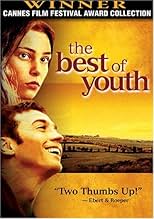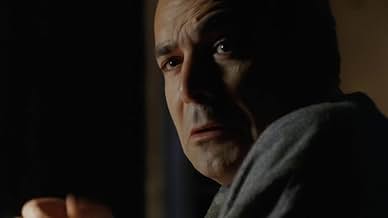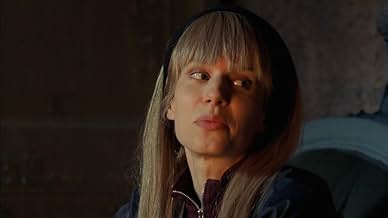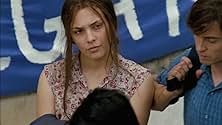An Italian epic that follows the lives of two brothers from the 1960s to the 2000s.An Italian epic that follows the lives of two brothers from the 1960s to the 2000s.An Italian epic that follows the lives of two brothers from the 1960s to the 2000s.
- Director
- Writers
- Stars
- Awards
- 33 wins & 25 nominations total
- Director
- Writers
- All cast & crew
- Production, box office & more at IMDbPro
Featured reviews
10nturner
No, the number of minutes is no typo. This film is over six and a half hours long. But as Roger Ebert says, "I dropped outside of time and was carried along by the narrative flow; when the film was over, I had no particular desire to leave the theater, and would happily have stayed another three hours." Of course, I was watching in the comfort of my home but I agree completely with Mr. Ebert.
The narrative covers the years 1966 through 2003 and focuses primarily upon the older brother of a middle class Italian family. As it begins, the two brothers of the family are ready to pursue college education as an avenue to successful careers. The younger of them is volunteering at a local mental facility as a walker - a companion for patients who need to explore the world outside the institution. He finds that the girl he accompanies is being mistreated and more or less kidnaps her in an attempt to return her to her father's home. In this effort he seeks the help of his brother and the two embark upon an idealistic quest to return the girl to the love and safety of her home. The unhappy result of their venture changes the outlooks of both and sets them on paths which diverge from their original plans. Each chooses a new course which is in conflict with his basic personality. The older brother, who had been practical in all of his previous projects, finds himself diving into an alternative culture, whereas the younger, who had been more footloose, joins the military and eventually becomes a policeman. The encounters of both during the almost forty year span of the film gives us many insightful "what ifs" of two lives and reminds us of the enormous effect sheer chance has upon each of us.
If you are familiar with the Italian political climate and events during the era of this film, your enjoyment will be heightened , but even someone as politically innocent as I had no trouble understanding the conflicts of the major characters that come from diverging ideologies. (I can probably be pretty much assured that if you are a HSC "regular" you are well versed in the politics of Italy in the latter part of the Twentieth Century.) This film has a great "feel" to it in that it doesn't fall into the trap of being overly melodramatic, which is often the bent of films that span long periods of time. I was left with a good feeling at the end but it arose from having viewed the triumphs and tragedies of a very believable family, a family whose members change and grow as a result of their experience of life just as happens in all families no matter their geographic location.
As for geographic location, the viewer of this film is treated to many memorable scenes of Italy from the grit of the city to the blissful pleasures of the islands. The experience is one of a resident of the country rather than a tourist who only has privy to a gossamer view.
If you enjoy excellent film-making and a good story, I have no doubt that you will also be "carried along by the narrative flow" just as Mr. Ebert and I can guarantee you that you will enjoy the ride.
The narrative covers the years 1966 through 2003 and focuses primarily upon the older brother of a middle class Italian family. As it begins, the two brothers of the family are ready to pursue college education as an avenue to successful careers. The younger of them is volunteering at a local mental facility as a walker - a companion for patients who need to explore the world outside the institution. He finds that the girl he accompanies is being mistreated and more or less kidnaps her in an attempt to return her to her father's home. In this effort he seeks the help of his brother and the two embark upon an idealistic quest to return the girl to the love and safety of her home. The unhappy result of their venture changes the outlooks of both and sets them on paths which diverge from their original plans. Each chooses a new course which is in conflict with his basic personality. The older brother, who had been practical in all of his previous projects, finds himself diving into an alternative culture, whereas the younger, who had been more footloose, joins the military and eventually becomes a policeman. The encounters of both during the almost forty year span of the film gives us many insightful "what ifs" of two lives and reminds us of the enormous effect sheer chance has upon each of us.
If you are familiar with the Italian political climate and events during the era of this film, your enjoyment will be heightened , but even someone as politically innocent as I had no trouble understanding the conflicts of the major characters that come from diverging ideologies. (I can probably be pretty much assured that if you are a HSC "regular" you are well versed in the politics of Italy in the latter part of the Twentieth Century.) This film has a great "feel" to it in that it doesn't fall into the trap of being overly melodramatic, which is often the bent of films that span long periods of time. I was left with a good feeling at the end but it arose from having viewed the triumphs and tragedies of a very believable family, a family whose members change and grow as a result of their experience of life just as happens in all families no matter their geographic location.
As for geographic location, the viewer of this film is treated to many memorable scenes of Italy from the grit of the city to the blissful pleasures of the islands. The experience is one of a resident of the country rather than a tourist who only has privy to a gossamer view.
If you enjoy excellent film-making and a good story, I have no doubt that you will also be "carried along by the narrative flow" just as Mr. Ebert and I can guarantee you that you will enjoy the ride.
This is a great movie! I thought that all of the acting by every single actor in the movie was just bloody fantastic. I thought that every one of the characters in the movie was very believable and all of them brought me to certain emotions, it was just a great story told in a great way and again what sold it all to me was the great acting by everyone involved from the stars on down to just the supporting bit players who make this movie work. Great big kudos to the director for getting such wonderful performances out of all of these people, I would definitely recommend seeing it to any fan of movies and/or fans of great acting.
10Peegee-3
Can art transform life? If so, I would elect "The Best of Youth" as a primary candidate for that possibility.
Almost never in my over 60 years of film viewing have I been as deeply affected, haunted by characterizations, poetic dialog and brilliantly unexpected turns...and breadth of scope. The nuances of relationship between people...in this case the Italian family Carati, their lovers, friends, wards...are so moving, so deeply portrayed and inhabited by the actors that I was not only moved to tears, but inspired. Here is a view of how human beings can live the humanity so desperately needed in this crazed and warring world...also presented as an integral part of plot and interaction...and this done without any sort of didactic or polemic foisting...All achieved through the intimate and profound struggles of the film's characters.
Imagination and the incredible sensibility of director (Marco Tullio Giordana),writers (Petraglia and Rulli) and actors (most outstanding: Luigi LoCacio, Alessio Boni, Adriana Asti and Jasmine Trinca) combine to offer a film that carried this participant (for that's what I felt) into a realm only experienced by exceptional literature.
As is obvious...I highly recommend seeing this movie.
Almost never in my over 60 years of film viewing have I been as deeply affected, haunted by characterizations, poetic dialog and brilliantly unexpected turns...and breadth of scope. The nuances of relationship between people...in this case the Italian family Carati, their lovers, friends, wards...are so moving, so deeply portrayed and inhabited by the actors that I was not only moved to tears, but inspired. Here is a view of how human beings can live the humanity so desperately needed in this crazed and warring world...also presented as an integral part of plot and interaction...and this done without any sort of didactic or polemic foisting...All achieved through the intimate and profound struggles of the film's characters.
Imagination and the incredible sensibility of director (Marco Tullio Giordana),writers (Petraglia and Rulli) and actors (most outstanding: Luigi LoCacio, Alessio Boni, Adriana Asti and Jasmine Trinca) combine to offer a film that carried this participant (for that's what I felt) into a realm only experienced by exceptional literature.
As is obvious...I highly recommend seeing this movie.
"Best of Youth (La Meglio gioventù)" proves that Italians have learned the art of the long-form television mini-series that the British have long mastered.
Covering a somewhat same period of the baby boom generation as "In A Land of Plenty," it has more of the generational feel of individuals caught up in history as we have usually seen in British mini-series about end-of-the-eras or World War I, such as "Brideshead Revisited" and "Jewel in the Crown." U.S. mini-series were more successful as sweeping historical epics, even when they were also family sagas like "Roots" and "Centennial;" when the networks tried to interpret more recent history, as in "The Sixties," the set characters sped through "Zelig" and "Forest Gump"-like in happening to be at the right place at the right time; perhaps the several seasons combined of the NBC series "American Dreams" could be considered comparable in showing how the times that are a-changing affect a family.
"Best of Youth" is being released in the U.S. in movie theaters, though I'm not sure even shown in two parts of three hours each how edited it is from the original format, as other grand European mini-series like "Berlin Alexanderplatz," "Das Boot" and "Fanny and Alexander" were originally only shown in the U.S. in truncated theatrical versions as even PBS seems averse to television with subtitles so we rarely get to see the best of world television. Comparison to the Italian film "The Leopard" is unfair as that was not created in the same format and covers a shorter period of historical time.
"Best of Youth" combines charismatic acting, leisurely directing amidst beautiful scenery in several parts of Italy with writing that takes the trajectories of complex yet consistent characters' lives believably and searingly affected by uniquely Italian experiences of the baby boomers' young adult years through middle age, without the American tendency to reject or regret youthful ambitions, through the lens of local natural disasters, violent political activities, judicial battles against the Cosa Nostra, European economic changes, with regional variations, that Americans rarely see in movies.
The focus is primarily on two brothers from the 1960's almost to the present, played by two actors who must be the equivalent of George Clooney and Richard Chamberlain in Italian television. Alessio Boni in particular as Matteo captures the screen with such tortured macho dynamism that it's no wonder he's gone on to play Heathcliff and Dracula in other mini-series. His Paul Newman-like startling blue eyes become a talking point of the series and a continuing visual leitmotif. Similarly, the physical differences between the two actors help to point up the different paths the brothers take through life, even as the casting of other family members to look like them is eerily effective.
The series is particularly good at capturing the camaraderie amongst old male friends over the years and the intimate interactions of members of a family, particularly with children, with a strong theme of the importance of both as an anchor.
Unlike in American TV where women are adjuncts as the girlfriend/wife/mother, the key women here are crucial fulcrums in the brothers' lives and have separate intellectual, psychological and emotional demands.
The emotions are important here -- grief is shown very movingly, with more pain and tears than American culture usually allows. In one extended scene, we see a grieving mother walk slowly up a long flight of stairs in numbed silence and gradually see her revive as she learns of surprise news about her son.
There are of course some coincidences of family members' and friends' paths crossing at key junctures, but the story overall grips us.
The pop music selections,American, European and Italian, are wonderfully evocative.
Covering a somewhat same period of the baby boom generation as "In A Land of Plenty," it has more of the generational feel of individuals caught up in history as we have usually seen in British mini-series about end-of-the-eras or World War I, such as "Brideshead Revisited" and "Jewel in the Crown." U.S. mini-series were more successful as sweeping historical epics, even when they were also family sagas like "Roots" and "Centennial;" when the networks tried to interpret more recent history, as in "The Sixties," the set characters sped through "Zelig" and "Forest Gump"-like in happening to be at the right place at the right time; perhaps the several seasons combined of the NBC series "American Dreams" could be considered comparable in showing how the times that are a-changing affect a family.
"Best of Youth" is being released in the U.S. in movie theaters, though I'm not sure even shown in two parts of three hours each how edited it is from the original format, as other grand European mini-series like "Berlin Alexanderplatz," "Das Boot" and "Fanny and Alexander" were originally only shown in the U.S. in truncated theatrical versions as even PBS seems averse to television with subtitles so we rarely get to see the best of world television. Comparison to the Italian film "The Leopard" is unfair as that was not created in the same format and covers a shorter period of historical time.
"Best of Youth" combines charismatic acting, leisurely directing amidst beautiful scenery in several parts of Italy with writing that takes the trajectories of complex yet consistent characters' lives believably and searingly affected by uniquely Italian experiences of the baby boomers' young adult years through middle age, without the American tendency to reject or regret youthful ambitions, through the lens of local natural disasters, violent political activities, judicial battles against the Cosa Nostra, European economic changes, with regional variations, that Americans rarely see in movies.
The focus is primarily on two brothers from the 1960's almost to the present, played by two actors who must be the equivalent of George Clooney and Richard Chamberlain in Italian television. Alessio Boni in particular as Matteo captures the screen with such tortured macho dynamism that it's no wonder he's gone on to play Heathcliff and Dracula in other mini-series. His Paul Newman-like startling blue eyes become a talking point of the series and a continuing visual leitmotif. Similarly, the physical differences between the two actors help to point up the different paths the brothers take through life, even as the casting of other family members to look like them is eerily effective.
The series is particularly good at capturing the camaraderie amongst old male friends over the years and the intimate interactions of members of a family, particularly with children, with a strong theme of the importance of both as an anchor.
Unlike in American TV where women are adjuncts as the girlfriend/wife/mother, the key women here are crucial fulcrums in the brothers' lives and have separate intellectual, psychological and emotional demands.
The emotions are important here -- grief is shown very movingly, with more pain and tears than American culture usually allows. In one extended scene, we see a grieving mother walk slowly up a long flight of stairs in numbed silence and gradually see her revive as she learns of surprise news about her son.
There are of course some coincidences of family members' and friends' paths crossing at key junctures, but the story overall grips us.
The pop music selections,American, European and Italian, are wonderfully evocative.
I waste a lot of time reviewing cute but rubbishy science fiction and horror films on this site. I'm a bit out of practice with watching, and critiquing, actual drama! But of course, I still realize that the key to great drama is the characters - and they make this epic Italian miniseries-turned-movie work, and work beautifully at that.
"The Best of Youth" focuses on various members of the Carati family and their friends, advancing from the 1960s to the near-present as it chronicles their lives in the context of social turmoil in Italy as a whole. For the most part, the story never drags, and every single character is compelling and sympathetic.
Many of the character have flaws, but they're not bad people - just complex. Many tragic things happen, but the film never wallows in misery, except on one wholly justified occasion. Moral conflicts are explored not in black-and-white, but in shades of grey. In other words, "The Best of Youth" is rich with the kind of warmth, complexity and subtle nuances that you tend to miss in most American dramas - even the ones that win Oscars.
I won't spoil the plot, really - I'll just say that both of the main characters, brothers Matteo and Nicola Carati, are charismatic and cool and well worth six hours of screen time. They're also very different, which keeps things interesting.
Are there any significant flaws here? Nah, not really. My interest waned a bit during some segments, particularly the historical ones that aren't explained that well. There's also a bit of cheesy makeup and blue screen, but that can be excused because this is really a TV production, as I understand it, not a big movie. Besides, I sort of love production flaws. They're fun, aren't they?
On a totally pointless note, I'd like to mention a strange plus of "The Best of Youth" - much of the cast is totally gorgeous. Guys and gals alike have reason to rejoice here...
One final random thought. While I'm glad that "The Best of Youth" was distributed and well-received in the U.S., I'm annoyed that it was publicized as being "like the Godfather" or "like the works of Scorcese." It's nothing like the Godfather, it's nothing like Scorcese. The marketers seemed to have believed, unfortunately, that U.S. audiences are only interested in Italian criminals, not normal Italian people. This sort of irritates me. (Note my surname and you'll figure out why!) But such concerns have nothing to do with the actual movie, which is pretty much flawless.
"The Best of Youth" focuses on various members of the Carati family and their friends, advancing from the 1960s to the near-present as it chronicles their lives in the context of social turmoil in Italy as a whole. For the most part, the story never drags, and every single character is compelling and sympathetic.
Many of the character have flaws, but they're not bad people - just complex. Many tragic things happen, but the film never wallows in misery, except on one wholly justified occasion. Moral conflicts are explored not in black-and-white, but in shades of grey. In other words, "The Best of Youth" is rich with the kind of warmth, complexity and subtle nuances that you tend to miss in most American dramas - even the ones that win Oscars.
I won't spoil the plot, really - I'll just say that both of the main characters, brothers Matteo and Nicola Carati, are charismatic and cool and well worth six hours of screen time. They're also very different, which keeps things interesting.
Are there any significant flaws here? Nah, not really. My interest waned a bit during some segments, particularly the historical ones that aren't explained that well. There's also a bit of cheesy makeup and blue screen, but that can be excused because this is really a TV production, as I understand it, not a big movie. Besides, I sort of love production flaws. They're fun, aren't they?
On a totally pointless note, I'd like to mention a strange plus of "The Best of Youth" - much of the cast is totally gorgeous. Guys and gals alike have reason to rejoice here...
One final random thought. While I'm glad that "The Best of Youth" was distributed and well-received in the U.S., I'm annoyed that it was publicized as being "like the Godfather" or "like the works of Scorcese." It's nothing like the Godfather, it's nothing like Scorcese. The marketers seemed to have believed, unfortunately, that U.S. audiences are only interested in Italian criminals, not normal Italian people. This sort of irritates me. (Note my surname and you'll figure out why!) But such concerns have nothing to do with the actual movie, which is pretty much flawless.
Did you know
- TriviaOriginally developed as a miniseries for television. It was then released in cinemas in June 2003 as two three-hour films after the uncut six-hour version had been screened to great acclaim at the Cannes Film Festival. It was eventually aired on Italian TV as originally intended, in 4 parts, in November 2003.
- Goofs(at around 27 mins) After a caption has shown that the film is set in 1966 at the beginning and the main characters are getting into a car, a radio is heard playing the song "Might just take your life" by Deep Purple. This song was released in 1974.
- Quotes
Sara Carati, adult: What should I do?
Nicola Carati: I don't know, it depends on how strong you feel... Are you happy now?
Sara Carati, adult: Of course I am!
Nicola Carati: Then, it's time to be generous
- ConnectionsEdited into Colpiti al cuore (2019)
- How long is The Best of Youth?Powered by Alexa
Details
- Release date
- Country of origin
- Official sites
- Languages
- Also known as
- The Best of Youth
- Filming locations
- Production companies
- See more company credits at IMDbPro
Box office
- Gross US & Canada
- $274,024
- Opening weekend US & Canada
- $7,490
- Mar 6, 2005
- Gross worldwide
- $2,799,773
- Runtime
- 6h 14m(374 min)
- Color
- Sound mix
- Aspect ratio
- 1.85 : 1
Contribute to this page
Suggest an edit or add missing content
































